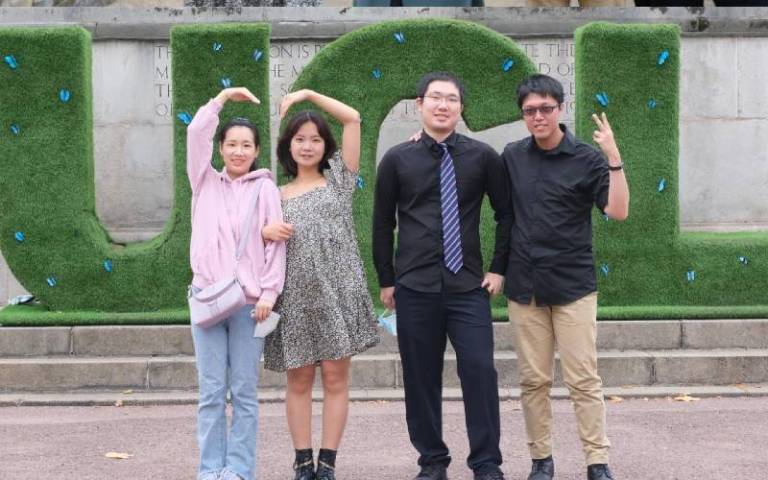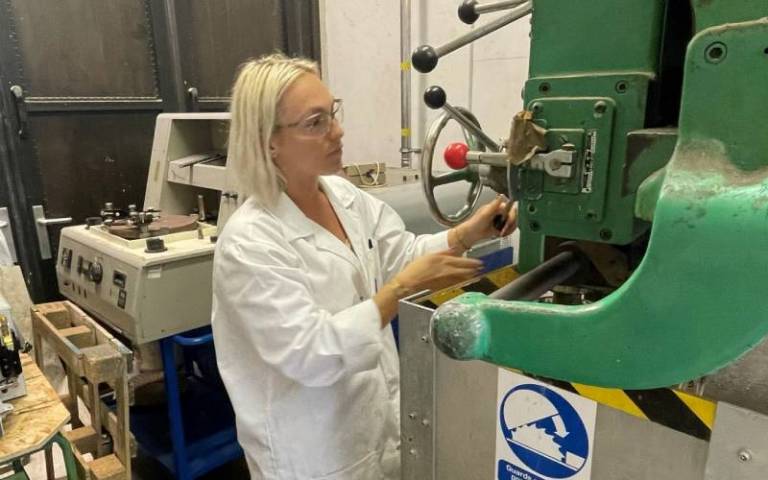MAPS 2022 Postgraduate (MSc) Innovation and Enterprise Prize Competition Winners Announced
19 December 2022
Many congratulations to Yuxin Quin, Xiquian Luo, Yu-kai Su and Zijie Xu, the "Bio CLS Team", first place winners, and Danica Davis, second place winner, of the 2022 MAPS Faculty Postgraduate (MSc) Innovation and Enterprise Prize Competition.

Postgraduate (MSc) Innovation and Enterprise Prize Competition
The 2022 Postgraduate Innovation and Enterprise first place prize was awarded to Yuxin Qin, Xiqian Luo, Yu-kai Su and Zijie Xu (UCL Institute for Materials Discovery). The second place prize was awarded to Danica Davis (UCL Earth Sciences). Their projects were deemed to have an outstanding innovative aspect and a potential economic and societal impact. The competition aimed to motivate entrepreneurial spirit among the students.
"Bio CLS Team": Yuxin Quin, Xiquian Luo, Yu-kai Su and Zijie Xu - UCL Institute for Materials Discovery
"Biogradable cellulose-lignin straws (CLS)"
The BIO CLS team's supervisor Dr Mojtaba Abdi Jalebi said:
"I am delighted that a group of my MSc students won the MAPS Postgraduate Innovation and Enterprise Award for their group project in my module “Advanced Materials for Real-World Applications”. This innovative project on development of biodegradable cellulose-lignin straws (CLS) has significant potential to be commercialised with clear advantages over the market-leading straws as a sustainable solution for eco-friendly lifestyles.
It was a great pleasure to work with this group of motivated MSc students with great enthusiasm, ability to think out of the box and with keen interest in entrepreneurship. I am very thankful to MAPS Innovation and Enterprise team for creating such a fantastic initiative that motivates students to think about the enterprise aspect of their projects and research with potential exploitation opportunities that could make a real impact in the society."
In their response to being awarded first prize, the Bio CLS team stated:

“The world consumes huge tonnes of non-degradable plastic damaging the vulnerable environment. As the alternatives of conventional plastic straws, polylactic acid (PLA) and paper straws are also unsatisfactory due to the high cost, poor drinking experience, and low degradability. To reduce the severe plastic pollution and not compromise on satisfaction and price, we designed cellulose-lignin straws (CLS) that meet the demands of excellent hydrophobicity, superior biodegradability, and extremely low cost. We have completed the preliminary proposal and are currently, looking for investment opportunities.
The most important thing we have learnt from the research project at IMD is to precisely target to problems and customise the specific solutions, contributing to the world we live in. Dr Mojtaba Abdi Jalebi's ideology “technology for all, all for technology” highly inspired us to have a deep dive in plastic pollution. The reports of ocean pollution caused by plastic waste surprised us, improving our awareness of environmental issues.
This competition motivated us to think about the commercial viability, potential economic, and social impact of scientific research and to develop our innovative and entrepreneurial spirit. During the competition, our team members had their own roles to play, and we constantly exchanged ideas, expanded our mindsets, and made the progress together. It is a meaningful experience for our future careers!"
Danica Davis - UCL Earth Sciences
"Investigating Carbon Mineralisation Storage Potential in SW Icelandic Basaltic Formations"
Danica's supervisor Professor Tom Mitchell said:
"I was delighted that Danica won a MAPS Innovation and Enterprise prize, an exciting scheme designed to recognise the impact of research students work in the real world. Dani’s excellent Masters project collaborated with industry and focussed on estimating the storage capacity of basaltic rocks in SW Iceland for the use of a technology that captures CO2 and turns it permanently into stone underground within two years of injection (https://www.carbfix.com).
Danica developed and implemented methodologies for automating the estimation of storage capacity in newly identified CO2 storage reservoirs from imaged drilled rock cores she took on fieldwork in Iceland, calibrating her digital image analysis with laboratory measurements at UCL Earth Sciences. These cores were taken from locations that are designed to test the applicability of the method by facilitating CO2 mineral storage in water-scarce environments as well as coastal regions, and offshore where the largest CO2 storage potential may lie. Danica was a pleasure to work with, and the prize is well deserved!"
In her response to being awarded the prize, Danica said:

“For my Masters research project I studied basaltic bedrock in Iceland for its use in carbon capture and storage. An Icelandic company, Carbfix, have developed a technology where carbon dioxide is injected into naturally reactive mafic rock where it is mineralised and stored as solid carbonates, with negligible risk of leakage. I went to the University of Iceland's Research Centre, Gamla Kaupfélagið, to analyse three drill cores from SW Iceland where the next CO2 injections are set to take place.
I used high resolution images of drill core, which were processed using MATLAB, to estimate the porosity of the core at different depths. I also performed experiments to determine the effective porosity and permeability of the core at specific depths. Using this information, we can map these properties in the subsurface and predict how CO2 may be stored once it is injected, and what effect it will have on the permeability of the rock. This is important as the porosity and permeability of the rock determines how much CO2 can be stored.
The MAPS competition has encouraged me to think about the global impacts of my research, as understanding the mechanics of carbon mineralisation in basalt will determine how it can be expanded to different basalt provinces in the future."
 Close
Close

